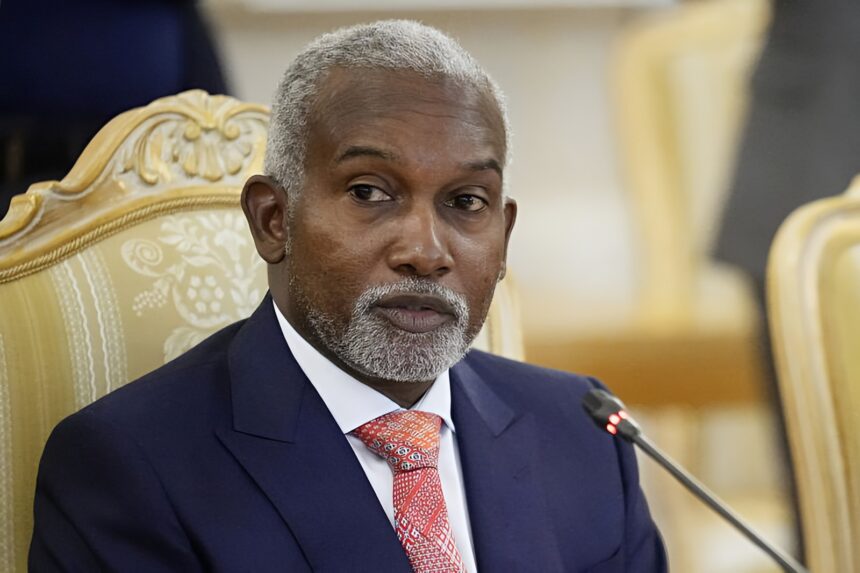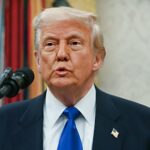Nigeria’s Minister of Foreign Affairs, Ambassador Yusuf Tuggar, has linked the escalating U.S.-Nigerian diplomatic tensions to Nigeria’s refusal to accept Venezuelan deportees, including ex-prisoners, from the United States.
Tuggar made this disclosure while speaking on Channels Television’s Politics Today on Thursday, July 10, 2025, hinting that while Nigeria flagged down the request, the U.S. government retaliated with steep tariffs and a drastic reduction in visa validity for Nigerians.
The latest measures against Nigeria by United States President Donald Trump’s administration come days after President Bola Tinubu participated at the BRICS summit in Brazil.
But in the Minister’s words, he said: “The issue of tariffs may not necessarily have to do with us participating in BRICS. You have to also bear in mind that the U.S. is mounting considerable pressure on African countries to accept Venezuelans to be deported from the U.S., some straight out of prison.
“It will be difficult for a country like Nigeria to accept Venezuelan prisoners into Nigeria. We have enough problems of our own.
“We cannot accept Venezuelan deportees to Nigeria, for crying out loud. We already have 230 million people. You will be the same people who would castigate us if we acquiesce to accepting Venezuelans from U.S. prisons to be brought in.
“The issue of accepting Venezuelan deportees, honestly, I don’t think is something that Nigeria is in a position to work with. And I think it would be unfair to insist that Nigeria accepts 300 Venezuelan deportees. Maybe that might just even be the beginning.”
Pan-Atlantic Kompass reports that the revelation by the Nigeria’s Foreign Affairs Minister comes as the Trump’s administration continues its hardline stance on immigration and forceful removals from the U.S, including what has been termed as ‘secret deportation’ of prisoners out of U.S. jails.
In May, this digital magazine had reported that a federal judge in Boston slammed the U.S. government’s ‘secret deportation’ of eight immigrants, said to be ‘hardened criminals’ to South Sudan. Some of them have been convicted of rape, murder or armed robbery prior their deportation, according to U.S. media reports. At a news briefing, Todd Lyons, the acting head of U.S. Immigration and Customs Enforcement (ICE), had called the eight “dangerous criminals” and said their home countries had refused to take them back. But only one of the eight was actually a South Sudanese citizen. The rest had no ties to South Sudan in any way, it was later revealed.
Addressing the new U.S. visa policy slapped against Nigeria, leading to soaring U.S.-Nigerian diplomatic tensions, the Foreign Affairs Minister maintained that the claim by the U.S. that the development was based on reciprocity was false.
He explained that Nigeria operated and issued a 90-day visa policy, same as the U.S, stating that the only difference was that Nigeria has introduced electronic visas to save time.
“We are talking to the Americans. We are engaging them. We are also explaining and reminding them that we issue them five-year multiple entry visas, the same way that they issue regular travellers five-year multiple entry visas.
“What Nigeria has done that differs is simple. We used to have a visa-on-arrival that wasn’t running efficiently. We introduced these online electronic visas that you can apply for so that it saves you time, instead of just arriving and then going through the process of getting the visa when you have already arrived.
“We have different categories of visas. There are people who are first-time travelers who are coming as tourists who are probably not likely to come back to Nigeria again, maybe because they’re coming for a short while, and they get those 90-day visas.
“So our visa is not saying that every American is only being given 90-day visas or three months or whatever. We give Americans, there are loads of Americans, who have these long-term visas. It is not based on reciprocity,” the minister added.
Recall that the U.S. Department of State recently announced the reduction in visa validity for Nigerians, slashing non-immigrant visas to single-entry, three-month terms.
The U.S. decision, effective July 8, 2025, limits visas such as B1/B2 (business/tourism), F (students), and J (exchange visitors) to three months, a sharp departure from the previous two-year, multiple-entry policy and has further triggered U.S.-Nigerian diplomatic tensions.





